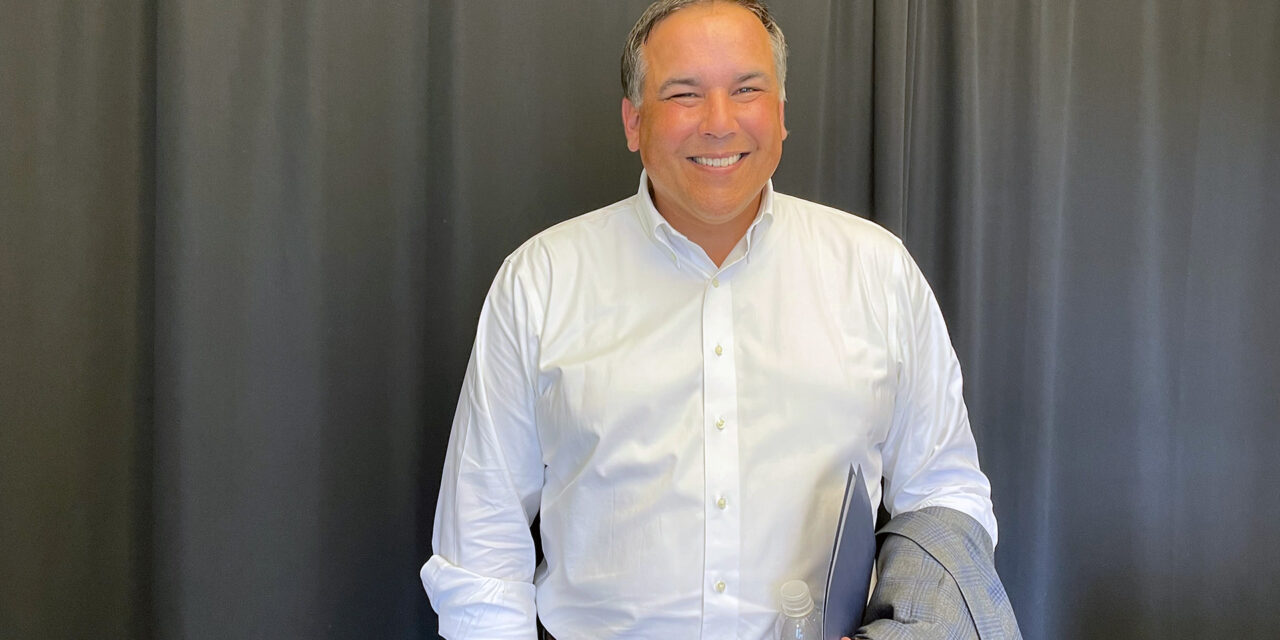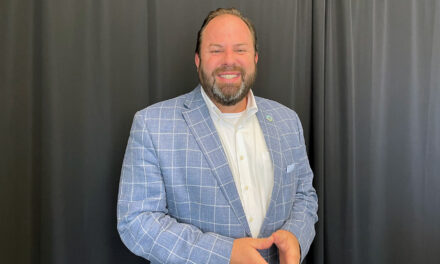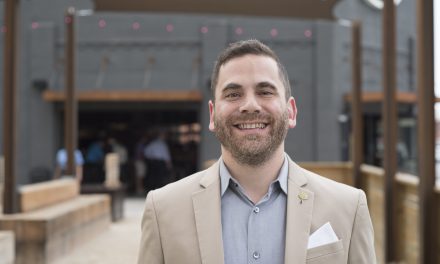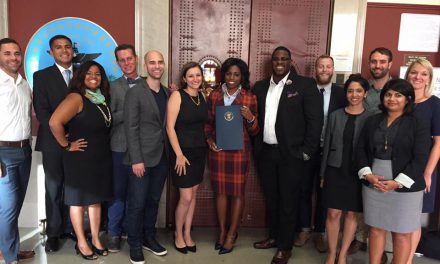Podcast: Play in new window | Download
Subscribe: RSS
Tim Fulton 00:08
Welcome to the confluence cast presented by Columbus underground. We are a weekly Columbus centric podcast focusing on the civics, lifestyle, entertainment, and people of our city. I’m your host, Tim Fulton this week. In anticipation of this fall’s election, the confluence cast is endeavoring to introduce Columbus voters to the 12 Council and two mayoral candidates in their own words. Mayor Andrew Gunther is ready for round three. After serving the City of Columbus from the top political position for the past eight years, he’s running for four more. In today’s interview, Ginther talks about police reform, housing development, zoning updates and economic development. You can get more information on what we discussed today in the show notes for this episode at the confluence cast.com. Enjoy the interview. Sitting down here in person with Mayor Andrew Gunther. Mayor Gunther, how are you, sir?
Andrew Ginther 01:08
Doing great. Thanks for having me.
Tim Fulton 01:10
Good. Tell us about how it’s been. You’re coming up on the end of two terms as mayor running for your third. How has that office held you?
Andrew Ginther 01:21
You know, it’s been one of the greatest honors of my life, to serve as mayor in the city I grew up in. There aren’t too many folks that get to have their dream job in their hometown and have had an absolute blast. I’d be lying to you if I told you the last four years have been any easy walk in the park, global pandemic greatest racial reckoning on police community relations in a generation and a spike in violence that cities across America have been facing, it has been challenging. In the last four years in particular, I’ve never quite had the personal and the professional intersect with such acuity as the last four years as well. So I’ve lost my mother, my father, in my niece in a tragic car accident all during that same period of time. And so generally when your professional life is going well, personal life might be troubling or vice versa. This the first time in my life where I’ve had both be so challenging and difficult at the same time. So I have been very grateful for my faith and my family to help me during a specially challenging time and couldn’t be more upbeat and optimistic about the future.
Tim Fulton 02:48
Talk us through some of the successes you feel like you’ve had in either the two terms.
Andrew Ginther 02:53
Well, I’m really proud of the fact we have made more reforms and changes to the Division of police than ever before in the city’s history, we hire the first chief of police from outside the division of police, we’ve been talking about a civilian review board and Inspector General for decades in Columbus, we got it done. It’s in place. It’s an operation. And really proud of the fact that you know, there’s still a lot of work to be done when you’re changing culture takes time. But the chief is making a significant progress with changing the culture, the division of police taken us from being a 20th century law enforcement organization to a 21st Century Community Policing organization. And I think you can see that in the great work of the dialogue team under the direction and guidance of Dr. Clifford Stott, who’s now kind of in residence, if you will, at the Glenn college at Ohio State. He’s one of the world’s, you know, leading experts on dealing with First Amendment protest issues, and really helped us realize that that’s not just about protests and First Amendment issues where we clearly missed the mark and fell short and 2020 and have made significant changes and reforms there. But also just the way, you know, true community policing needs to happen. You know, so much of policing is that that consent is given by the government, and it is granted to them and is based on legitimacy. So the more legitimacy the division of police has, the safer we will all be. And so he’s helping us to continue to change the culture, the division of police while investing in more and more officers that comprehensive approach prevention, intervention, and enforcement. That’s so critically important. We can
Tim Fulton 04:45
sorry, yeah, just ask what that looks like on the ground because I’ve seen him quoted. I don’t quite recall when exactly he was announced, but I see him quoted and his quotes are this is evidence that this is needed. Yeah. And not so much and maybe It’s truncating because of column inches, but not so much a conversation of here’s what the outcomes gonna be. Here’s what the boots on the ground look like. Forgive that analogy. Yeah. And is there you know, basically a policy stance that comes out of that?
Andrew Ginther 05:14
Well, I think you know, what people are going to see touch and feel you can get a sense of with our dialogue team, those teams and the blue vests that, particularly around First Amendment demonstrations and protests are on the scene, managing relationships, and making sure there’s a good flow of communication for folks who may have dramatically different perspectives or takes on that person’s position. But their ability to safely and respectfully have their First Amendment rights respected. That’s, you know, that’s a clear indication, I think you also are going to see more and more officers embracing the de escalation model and approach as part of the reason we’ve so dramatically increased our alternative crisis response. So we now have firefighters and paramedics and social workers responding to calls for service, maybe with and without uniformed police officers, because depending on the situation, particularly if you’re in mental health crisis, or there’s an overdose, you know, having a uniform law enforcement officer may or may not be what is required. And so the right response pilot has continued to grow. Obviously, our React team, Spark, there’s so many other great alternative response models that have really developed and we’re looking to continue to build those out, the atom H crisis center will open in the next two years, which shouldn’t be really important, because right now, if you are in mental health crisis, or you overdose, our officers really have only two places to take you to an ER, or to jail. And people in mental health crisis or that are battling addiction don’t belong either one of those places, they belong in treatment. And that’s what we’re so excited about with the atomies crisis center. And so by building out these models, funding them, growing them and expanding them, we think that we’re going to better serve the people of Columbus, first of all, getting people what they need, when they need it. And also being able to devote more of our police response to fighting violent crime, because that’s where our focus needs to be reducing violent crime, and having other members of the collaborative effort helping to take care of folks who have mental health crisis or they’re battling addiction.
Tim Fulton 07:39
What other thing other than policing violence, and it’s a big issue.
Andrew Ginther 07:43
Sure, huge issue. I think it’s the number one issue. And it’s one that takes up the overwhelming majority of the city budget. And we’ve seen some success we had in 2020 to 33% reduction in homicide and violent crime from 2021. It’s picked up a little bit this year, we have about 10, more homicides as of today than we did a year ago. But one of the things that is particularly disturbing is the amount of homicides as a result of domestic violence situations. Okay, so this year, I think we’re at about 18 homicides as a result of domestic violence situation. So sometimes that’s parent child, sometimes it’s intimate partner, or husband, wife. But it also this year, we’ve had issues with siblings. And, you know, one of the things we’re really focused on is how do we get, I mean, that’s not necessarily a situation that police can prevent or stop, right. We need to make sure that families in crisis, and clearly we have a number of families in crisis, are getting the services and resources that they need. And that folks that are in a domestic violence situation, are seeking out the help they need to try to prevent what has maybe a violent situation from becoming a deadly situation, and access to guns and the proliferation of guns. I know we’re going to talk a little bit, you know a little bit about that, because I mean, you know, one of the number one contributors to the spike in violence we’ve seen is the most reckless and, and and careless gun policy in the state’s history. I mean, and this isn’t just a beginner assault. This is the overwhelming majority of Ohioans who oppose concealed carry, who oppose stand your grand who oppose permitless carry. And so, you know, law enforcement, prosecutors, gun safety advocates and all the research shows. It isn’t about right or left Republican Democrat, you go to the John Hopkins Public Health Law Journal. And you look, the states with the highest rates of violent crime are the states with the most reckless and dangerous gun laws. And so you know, Well, our challenge is this, the state legislature knows what it needs to do 92 to 2% of Ohio and support some level of training, you know, in order to own a firearm, you know, 75% support uniform background checks, nearly 60% support and assault weapons ban, these are all things that Republicans, Democrats, independents all support. And the legislature refuses to act, we what we know is good policy based on evidence and research that at least get out of our way. And let cities take the actions that we need to take to protect the people to protect our officers, we’ve had more officers assaulted and shot this year than in recent history. And, you know, we’ve got to go after this, you know, proliferation of guns that are out there on Columbus, the streets and streets around the country.
Tim Fulton 10:56
And from a policing standpoint, I realized what can happen there to help get rid of guns, I guess, I wonder what actions you feel like. I think you just said Your hands are tied, right in terms of not being able to bring up legislation that would make it harder for folks to own guns are their action items, you feel like you could take
Andrew Ginther 11:19
Yeah, and we’re gonna continue to be creative and innovative, and we’re not, we’re not seeing it, and we’re gonna fight back. And right now we’re in court, as you know, with the state over common sense, safe storage, requiring people if they have a firearm in the home, that they lock it up and make sure it’s out of the hands. But the state is fighting us on that. And we have prevailed before we hope to prevail, again, in court, you know, just some comments at banning the capacity of large, you know, magazines, you know, so that we don’t have a semi automatic become an automatic and, you know, have deadly situations where, you know, dozens and dozens of people were shot in 30 seconds or less, because of, of large capacity magazines. So these are very common sense things that we’re putting in place, attempting to do what the state legislature refuses to do, quite honestly has attempted to preempt us on, but we’re not accepting that we’re not standing back and hoping they’re going to change their mind. We’re going to keep pushing it, we’re going to be aggressive.
Tim Fulton 12:20
I’m going to pivot a little bit to the things that maybe you think that you haven’t been successful on over the past eight years. What regrets Do you think you have there?
Andrew Ginther 12:28
Well, there are many regrets I had mentioned, I think, not meeting the community’s expectations back in 2020. Okay, with respect to how we handled, you know, peaceful protesters. We know there were also people that were doing property damage and assaulting police officers and assaulting others. I’m not talking about those, okay. But you know, how we handled, you know, folks who were peacefully protesting and demonstrating and advocating their First Amendment rights. And so you’ve seen it a huge shift in the way that we handle large crowds and protests. Part of that is under the advice and guidance of Dr. Clifford stuff that I mentioned, it’s at the Glenn College, obviously complying and following the marbley decision from Judge marbley. And other changes that we made just based on best practices, and certainly, with our new Chief of Police who handled things very differently in her role when she was with Detroit. And, you know, obviously wanted to see what best practices look like from across the country. I think one of the other things that I really had hoped to make more progress on, although I’m very proud of our record on housing, is having more partners in the region, joining this effort, we’ve made some good progress. We have folks now, in Franklin County and the adjacent counties talking about housing, we have for the first time ever secured a quarter of a billion dollars in two separate bond packages voted authority to use capital funds towards affordable housing and getting more housing units going. But as you know, we’ve had a supply problem for property before the Great Recession, we’ve had about only half the number of units coming to market at all price points, right? Because we need market rate, we need workforce attainable, and we need affordable. And we need to dramatically I want us to double the number of units coming to market every year for the next 15 years and collectively invest a billion dollars in getting more units to the market. Because we know that because of the supply problem, the folks that are feeling the squeeze the most with respect to rents, and certainly, you know, valuations price points and appraisals have been folks on the lower earning income level. So you know, those folks that you know, 15% or 20% have a Any increase or increase valuation and costs associated with that is really squeezing those folks. So we need more of, of everything coming to market and creating that pipeline. One of the biggest pieces to that is also changing our zoning code. We’re rewriting our zoning code for the first time in 70 years, think about where Columbus was 70 years ago, think about where we are today, it is going to really be challenging. There’s a reason folks haven’t rewritten this in 70 years, and we’re gonna have to increase density, we’re gonna have to embrace height. Because we, you know, those are the two major contributors to affordability. I would argue that this region has had a sprawl strategy for the last 40 years, hasn’t necessarily served us well. And it’s certainly not sustainable if we’re going to grow by a third more people in the region over the next 20 or 30 years. So we’re making some progress there. I wish we were further along on the housing front, but I’m really hopeful that there is going to be a regional housing collaborative, because the city of Columbus can’t solve the housing challenges of the region all by ourselves. Right. We need our suburban neighbors in Franklin County and the adjacent counties to join us in this effort.
Tim Fulton 16:21
I guess I’m curious. So just to boil down what I just heard it’s partnerships. It’s investment and zoning. Right. I guess my curiosity is and concern is at what point? Are we too late? At what point are we Austin? And like the, you know, ground was broken on Intel? And what is the is it coming far enough, quick enough for us not to experience a real problem.
Andrew Ginther 16:51
So you just put it in perspective, I think there were about 12,000 housing units, we’ve been averaging about 12,000 housing units coming to market every year for the next over the last 10 or 15 years. Austin has 40,000 We need to double the number of units just to maintain the certain level of affordability that we have. Now,
Tim Fulton 17:18
we had a problem before Intel. Yes, got it.
Andrew Ginther 17:21
And my challenge has been, you know, as mayor for the last eight years, I feel like I’ve been talking about housing for eight years. But it was only until Intel and Honda and LG, that folks, I feel like started talking about it and paying attention to it and realizing that we have to do something, I would argue that one of the things that is really, really good and important is the business community now views housing as a huge economic development issue. Because if you’re a major employer and employer that’s coming to Central Ohio, and you want to attract the best and the brightest from around the country in the world. They need some place to live and a place that they can afford and in a neighborhood with amenities that they desire. And so housing has gone from something that some folks were interested in maybe more in the nonprofit, higher ed, planning development realms, to now CEOs and corporate leaders are saying, this is a threat to our economic future, from job development or economic development, job creation standpoint. If we don’t have more housing of all types available, we just believe passionately that if you work in this region, you ought to be able to live here too. Whether you drive a bus, whether you run a company, whether you teach school, whether you’re taking care of my mom and dad and a senior center, that there’s a place for you in this community, and we have a lot of work to
Tim Fulton 18:47
do. Do you see the business community stepping up? And I do? I do.
Andrew Ginther 18:50
I think in particular, Steve Stein, our Huntington has been a very passionate, strong leader in the housing effort. Kenny McDonald has been part of this regional housing. He’s the President CEO of the Columbus partnership. He’s been working closely with Clark Mallory, the Affordable Housing Trust and other community partners around this regional housing collaborative. And so, you know, obviously, we’ve got great advocates in this community, you know, that are, you know, CEOs and business leaders, whether it’s Tani crane or Jean grody able or other business leaders that are engaged in this work. So I’m hopeful but to answer you the question you asked earlier. I think we really the next five to 10 years are going to be absolutely critical, and probably closer to five than 10. I mean, we have to move with a sense of urgency and purpose. But also resiliency because this is this is the challenge when you’re rewriting zoning codes, and making very difficult decisions that involve most people’s largest investment. Right their home Are there going to be setbacks, they’re going to be challenges. There are a lot of people that have are going to have a very vested interest in keeping things the way they are. But that’s not the way we want Columbus, we don’t just want to be bigger. Yeah, I want to be better. And that means we’re going to have to make difficult decisions around land use around density, around height, around transit, you know, with the link us initiative that we’re hoping to put back on the ballot, in the fall of November 2024, is going to be a game changer for our community. We need to invest in ourselves now. So that we can leave our kids and our grandkids, the type of community that they’re going to raise their kids. And
Tim Fulton 20:47
in addition to the matters, you’ve already brought up, talk to me about basically making the choice to run again, and what you hope to accomplish during that time.
Andrew Ginther 21:00
Yeah, I take this very seriously. And as we talked about, you know, the last couple of years in leadership, leadership has been very lonely in the last couple years, probably not nearly as as lonely as any other time in our city’s history, some of the most challenging times. And so I spent, you know, some time with this, about a year or so ago, I really thought about it. Because I think you got to be all in when you’re running for mayor, there may be other elected offices you can run for. But if you’re running for mayor, you got to be all in and you got to be all in for the next four years. And so, after, you know, I thought through it and made my decision, I went to my wife and daughter, because they’ve been through a lot to over the last four years and have seen some things that they’ve never seen before. And some challenges and they’ve seen, you know, their husband and their father go through some things that no other mayor has ever gone through. And so talk with him about their support for running for a third term. So I’m really excited. I am really excited, never been more bullish and hopeful about Columbus’s future. I believe that we are in a special moment in our city’s history, where if we make the right decisions, they’re going to be difficult, they’re going to be challenging, we’re going to make mistakes. But if we make if we make a concerted effort and commitment to one another, that we’re going to do what’s in the community’s best interest. And we’re going to invest in our people and our neighborhoods, and a better quality of life. We’re on a pretty incredible trajectory, to again, not just grow, for the sake of growth, not just be bigger, but better. And to manage a tremendous amount of growth in a relatively short period of time, in a thoughtful, equitable, progressive way.
Tim Fulton 23:02
Okay, harkening back to the focus areas that you had before, around policing, around guns around gun violence around violence in general. It strikes me a bit that I’ve seen a campaign from you before there was much more focused on neighborhoods, and basically the good the the, the investments and the personality of the city. And now having to focus on policing violence that the more difficult and child certainly challenging things, right? The positive and the negative. I’m curious if if you feel that way, if you feel like you’ve had to pivot in that way.
Andrew Ginther 23:46
Well, would you’re the mayor, you have it all on your plate. And I still believe my, my top three priorities are neighborhoods, neighborhoods, neighborhoods, now we’re talking about, we may have been talking about decades of disinvestment in neighborhoods that had been left out, left behind of Columbus’s success story. And I’ve been very purposeful and intentional about lifting those up, you know, Lyndon, the hilltop, and our next area of focus is going to be that Eastland area. And equity is not equality. And there are some in our community that want everything to be, you know, split up evenly and let everybody do the best they can with what they have and, and hope for the best. What I’ve called for, you know, through the equity agenda and opportunity rising is to be very purposeful and intentional. We’re going to invest more in neighbors and neighborhoods that have been left out and left behind. And so that isn’t necessarily a value shared by everybody. I have been openly criticized for focusing so much on Linden and the hilltop in the side in the south side, and that’s okay. You know, because I mean, very You’re purposeful and intentional. And that’s where I’m going to continue to invest. We’re going to continue to provide great city services throughout our city. But you know, we’re going to be very focused on these neighborhoods that quite honestly haven’t shared in the same levels of economic stress success to the rest of the city. Now, that extends to safety. Right? So not only do you have the one Lindon plan where public and private and everyone have invested at this point $150 million, when you take a look at all the investments from the Linden Community Center redesign of Hudson Avenue, the Habitat for Humanity investments Nationwide Children’s Hospital that extends to the south side, envision hilltop is a plan and both of those plans were created by and driven by the neighborhoods. Because we thought it was critically important. We were coming up with neighborhood plans, that they were owned by the community that they weren’t dropped in, you know, at a city hall in different diverse neighborhoods throughout the city. And envision hilltop has already, you know, seeing the hilltop early childhood center that’s going to offer you know 200 high quality preschool spots right there. One of the poorest enrolled preschool areas of the city, the fewest amount of spots available, were over on the hilltop and you know, to have that place open and now you know taking in kids and helping to get them ready for ready for kindergarten at Highland at John Burroughs and other elementary schools on the hilltop. You know, we’re really proud of that. And we’re going to continue to invest in neighborhoods, as well as neighborhood safety, you know, to make sure that we’re honoring our commitments.
Tim Fulton 26:44
I end every interview with two questions juxtaposing them one, what do you think Columbus is doing? Well, and what do you think Columbus is doing? Not so well.
Andrew Ginther 26:55
I would still argue that Columbus is doing very well, at our collaboration, cooperation, partnership. You know, I am, you know, very engaged with the central hub mayors and city Managers Association, the Ohio mayor’s alliance in the US Conference of Mayors. And there are many mayor’s from around the country that are envious of our ability, not only can we get the public sector, and the private sector in the room, there’s some committees around the country where you can’t get the city in the county room, even if they’re all the same party, certainly not the city, the county in the state, where possible, where they may be of different parties, and then you have the private sector at higher ed and nonprofits. I think there are a lot of places in the country. That talked to me all the time. And I know business leaders from around the country that come in here all the time, and higher ed and nonprofit leaders that talk about this, this collaboration, this commitment to the greater good. On behalf of the committee, which I think is going to serve us well served as well for economic development is served as well for Neighborhood Development. I think it’s going to serve as exceptionally well, with this great challenge around housing and transit. In the years ahead. I would say the the other challenge because growth has happened relatively low, minimally and consistently for the last 70 years. Okay. creating that sense of urgency has been challenging, because as we said earlier, I think we do have this five to 10 year window. This is a critically important time and window to make some very difficult decisions. So the time for study and analysis is looking around at best, it is time to do it is time to act. And that isn’t to say we’re going to be perfect. But the time for studying and designing and analysis. For the sake of paralysis is over. It’s time to act. And that’s the part where I think we need to make some strides in the next 1224 36 months.
Tim Fulton 29:19
That’s fair. You get there. Thank you for your time.
Andrew Ginther 29:22
Thanks for having me. Good to be with you.
Tim Fulton 29:34
Thank you for listening to the confluence cast presented by Columbus underground. Again, you can get more information on what we discussed today in the show notes for this episode at the confluence cast.com Please rate subscribe, share this episode of The confluence cast with your friends, family, contacts, enemies, your favorite voter. If you’re interested in sponsoring the confluence cast get in touch with us. We can be reached by email at info at the confluence cast.com Our theme music was composed by Benji Robinson. Our producers Phil Cogley. I’m your host, Tim Fulton. Have a great week.





